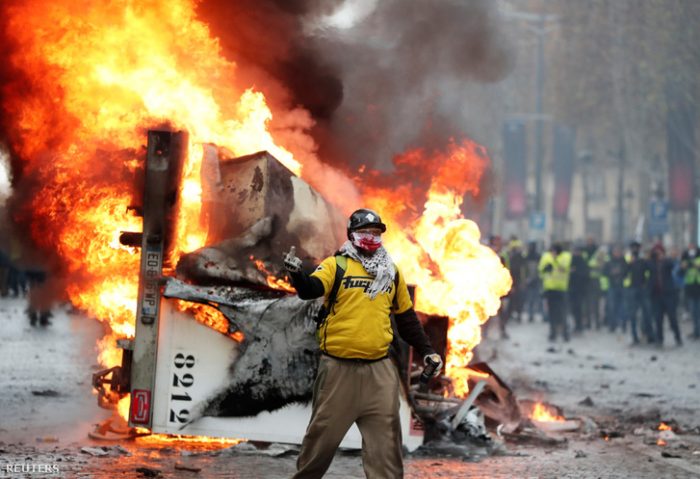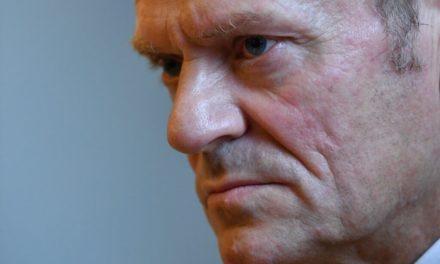And Europe does not defend itself against mass destruction, but rather lets them eat up its security and livable world. Since the practice of their cultural identity has already been visibly imposed on the western half of Europe, they must also face the consequences of their own former country's legal system. Therefore, the European "presumption of innocence" should not apply to all those who entered the path of sin, but the "presumption of guilt" they brought with them.
He refused to wear a mask and instead got into an argument with the police. The exchange of words turned into an exchange of blows. And Michel Zettler was beaten by the Paris police not because he is a colored music producer, but because the authorities did not comply with the law despite being told, i.e. he refused to put on the protective device that covers the nose and mouth.
Hundreds of thousands took to the streets in Paris and other French cities to protest against police brutality and demand freedom of the press. And the background was eerily similar to the case of the American George Floyd. It is true that the Frenchman without a mask did not even need hospital treatment, but 4 police officers were immediately arrested and imprisoned without any investigation or investigation.
Of course, this was not an acceptable satisfaction for the protesters, because in their holy indignation "within the legal framework" they set cars on fire, broke and crushed them in the name of free expression of opinion. The fact that a decree was issued stating that the faces of the police officers cannot be photographed and that the recording of them cannot be published in order to protect their privacy rights, caused uncontrollable anger among the citizens who wanted anarchy.
Politicians, public figures and public figures, as well as the journalists themselves, who, if even one wrong post about them comes to light on social media, immediately cried scandal in court because of their personal rights being violated.
So does the "presumption of innocence" exist - or can it only be interpreted selectively in a European way? The question is also whether the less than 250-year-old legal practice can be sustained in this form? Of course, the suggestion is not only waiting to be discussed in France, since in Austria the head of the Vienna branch of the Austrian National Security Agency was also removed from his office because a person of Chechen origin and a resident of Vienna took the lives of four people during his terrorist attack. The Slovak authorities had previously informed the Interpol center in The Hague that K. Fejzula had tried to buy weapons, but they later relaxed their close monitoring of the Chechen man because they were planning a large-scale operation and the Austrians had to regroup their manpower. Naturally, K. Fejzula sensed this and started killing.
This is France and Austria, but arson, murders, and clashes between juvenile gangs characterize everyday life in Sweden as well, while the police are hopelessly undertrained and understaffed. Crime with an immigrant background is constantly increasing in Germany as well.
The "presumption of innocence", i.e. the practice of proving guilt, paralyzes Europe's defense mechanism and the effectiveness of law enforcement. The law that has existed since the French Revolution of 1789 - which, it must be emphasized, is very functional in our civilized world - does not simply cause difficulties in maintaining order, but is unviable in the eyes of the foreigners who come here. Because, in a world with highly centralized political practices, the suspect must prove their innocence. If they are unable to do so, they can be declared guilty. This jurisprudence not only upsets liberal advocates, but also scares well-intentioned, rule-abiding European citizens.
And Europe does not defend itself against mass destruction, but rather lets them eat up its security and livable world. Since the practice of our cultural identity has already been visibly imposed on the western half of Europe, they must also face the consequences of their own former country's legal system. Therefore, the European "presumption of innocence" should not apply to all those who entered the path of sin, but the "presumption of guilt" they brought with them. If we want an even stronger protection, in my opinion, the classification of aiding and abetting into the group of "presumption of guilt" is an absolute must.
In this legal situation, the Austrian Chechen who wanted to buy a weapon would not be observed by the service, but would be arrested immediately, even if he did not fire his weapon. How the operationally proven suspicion of terrorism would be sufficient to remove potential perpetrators from European society.
And we, the majority, could enjoy the "presumption of innocence" as a guarantee of our law-abiding behavior. Because who does not wish to submit to the legal order, on what basis does he claim the protection provided by laws?!
László Földi












